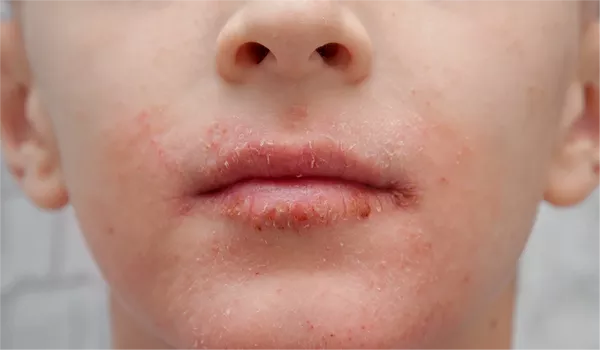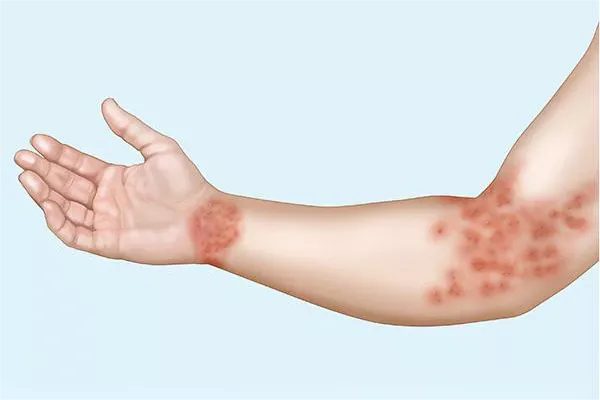Psoriasis is a chronic autoimmune condition characterized by the rapid buildup of skin cells, leading to the formation of scales and patches on various parts of the body. While psoriasis commonly affects the skin on elbows, knees, scalp, and lower back, it can also manifest on the lips, albeit less frequently. Psoriasis on the lips presents unique challenges due to the delicate nature of the area and its impact on daily activities such as eating, speaking, and kissing. Understanding the symptoms, causes, and treatment options for psoriasis on the lips is crucial for effective management of this condition.
What Does Psoriasis on the Lips Look Like?
Psoriasis on the lips typically appears as red or pink patches with distinct borders. These patches may be covered with white or silvery scales, giving them a rough texture. In some cases, the affected area may become swollen, making it uncomfortable or painful. Due to the constant movement and moisture in the mouth, psoriasis on the lips may also crack or bleed, leading to further discomfort.
One distinguishing feature of psoriasis on the lips is its tendency to affect both the outer edges of the lips and the inner lining of the mouth. This can make it difficult to distinguish from other oral conditions such as oral thrush or allergic reactions. However, unlike oral thrush, psoriasis does not typically cause creamy white lesions that can be wiped away. Instead, the scales associated with psoriasis are firmly attached to the skin and may require gentle exfoliation to remove.
Symptoms of Psoriasis on the Lips
In addition to the visual appearance described above, psoriasis on the lips may cause various symptoms, including:
- Dryness: The affected area may feel dry and tight, especially after eating or drinking.
- Itching: Psoriasis on the lips can be accompanied by itching, which may exacerbate the urge to scratch and further damage the skin.
- Burning Sensation: Some individuals with psoriasis on the lips report a burning sensation, particularly when consuming spicy or acidic foods.
- Pain or Discomfort: Due to the delicate nature of the lips, psoriasis lesions in this area can be painful, especially if they crack or bleed.
- Difficulty Eating or Speaking: Severe cases of psoriasis on the lips may interfere with eating, drinking, or speaking comfortably, affecting quality of life.
It is essential to note that psoriasis symptoms can vary widely among individuals, and not everyone will experience the same degree of discomfort or severity of symptoms.
Causes of Psoriasis on the Lips
The exact cause of psoriasis remains unknown, but it is believed to involve a combination of genetic, immune system, and environmental factors. Psoriasis on the lips may develop due to a flare-up of existing psoriasis elsewhere on the body or as an isolated condition affecting only the lips. Common triggers for psoriasis flare-ups include:
- Stress: Emotional stress or trauma can trigger psoriasis flare-ups, including those affecting the lips.
- Infections: Bacterial or viral infections, such as strep throat or cold sores, can exacerbate psoriasis symptoms.
- Injury or Trauma: Physical trauma to the lips, such as cuts, burns, or bites, may trigger psoriasis flare-ups in susceptible individuals.
- Medications: Certain medications, including lithium, beta-blockers, and antimalarial drugs, have been linked to psoriasis flare-ups.
- Smoking and Alcohol: Smoking and excessive alcohol consumption can increase the risk and severity of psoriasis symptoms, including those affecting the lips.
Additionally, changes in weather, hormonal fluctuations, and dietary factors may play a role in triggering or exacerbating psoriasis symptoms on the lips.
Diagnosis and Treatment of Psoriasis on the Lips
Diagnosing psoriasis on the lips typically involves a physical examination by a dermatologist or healthcare provider. In some cases, a skin biopsy may be performed to confirm the diagnosis and rule out other conditions. Once diagnosed, treatment options for psoriasis on the lips may include:
1. Topical Treatments: Corticosteroid creams or ointments are commonly prescribed to reduce inflammation and alleviate symptoms of psoriasis on the lips. Topical calcineurin inhibitors may also be used to help manage symptoms, particularly in sensitive areas such as the lips and face.
2. Moisturizers: Regular use of moisturizing lip balms or ointments can help hydrate the lips and reduce dryness associated with psoriasis.
3. Phototherapy: For more severe cases of psoriasis on the lips, phototherapy may be recommended. This treatment involves exposing the affected area to ultraviolet (UV) light under medical supervision to help reduce inflammation and slow the growth of skin cells.
4. Systemic Medications: In cases where topical treatments and phototherapy are ineffective, systemic medications such as methotrexate, cyclosporine, or biologics may be prescribed to help control psoriasis symptoms.
5. Lifestyle Modifications: Making lifestyle changes such as reducing stress, quitting smoking, and avoiding triggers can help prevent psoriasis flare-ups and improve overall management of the condition.
It is essential for individuals with psoriasis on the lips to work closely with their healthcare providers to develop a personalized treatment plan tailored to their specific needs and preferences.
Conclusion
Psoriasis on the lips can be a challenging condition to manage due to its impact on daily activities and the delicate nature of the affected area. Recognizing the symptoms and causes of psoriasis on the lips is the first step toward effective management and treatment. With proper diagnosis and treatment, individuals with psoriasis on the lips can achieve relief from symptoms and improve their quality of life. Working closely with healthcare providers and making lifestyle modifications can help individuals with psoriasis on the lips better manage their condition and minimize flare-ups.

























